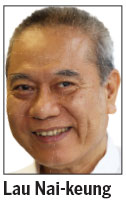Learn to be more skillful in government crisis management
Updated: 2013-08-20 06:35
By Lau Nai-keung(HK Edition)
|
|||||||
As Hong Kong people really began overseeing Hong Kong only after 1997, the learning curve has been steep. Desperate to acquire the true art of governance, our officials and politicians sometimes turn to books and movies. There was a time when copies of the BBC satire Yes, Minister (and the sequel Yes, Prime Minister) were given out as gifts in the circle, and guidance was sought in US political drama The West Wing. As the need to deal with counterparts up north increases, fictions about politics on the mainland, such as the popular Officialdom Notebook, have also grabbed local officials' attention recently.
If movies really can help, officials in Hong Kong should be watching Scandal, ABC's political thriller television series starring Kerry Washington. The show's protagonist, Olivia Pope, is partially based on Judy Smith, special assistant and deputy press secretary to then President George H. W. Bush. The story focuses on how Olivia Pope's crisis management firm, Pope & Associates, protects the public image of its clients and makes sure their secrets never get out. As the show is co-produced by Judy Smith herself, it really may reveal a thing or two as to how the White House handles crises.
Olivia Pope's approach is not that complicated. While the situations and the solutions vary from episode to episode, after taking in a case the first thing she does is, invariably, get to the bottom of the facts. In the next stage, she has to size her clients up and form an opinion before they are judged by the press or the law. "In this moment, we are the judge and the jury, the media and the public opinion," Pope describes this stage of her work in the debut episode.

A lot of the controversies surrounding our officials would never have gained steam if the government's public relations people had done the first two stages properly. The government cannot afford to let officials decide what to disclose and how to respond. It needs a competent crisis-management professional to identify all weaknesses before the press do and prepare tailor-made strategies that are issue-specific well in advance.
Forget about rules on declaration of interests. Forget about privacy. Our officials have to be tough if they want to be the last men, or women, standing in the current political environment, especially after the government described private interests in the recently revised guidelines as "the financial and other interests of the officer himself, his family and other relations, his personal friends, the clubs and associations to which he belongs, any other groups of people with whom he has personal or social ties, or any person to whom he owes a favor or is obligated in any way."
While it seems absurd to define one's private interests as the interests of one's personal friends, interests of family members have been long scrutinized by public opinion. Declaring the interests of one's spouse used to be enough, but now the public is demanding more. The sentiment is not entirely unreasonable given the Chinese society's conception of an extended family and the widespread practice of sharing resources even with distant relatives.
Under the circumstances, a rule-based approach, which our officials are familiar with, will ask "where the new line is", and hold consultations and form commissions to formulate new guidelines. People who favor this approach will find, to their dismay, that new rules alone will not be able to save them from criticisms.
The question that the public relations approach will be asking is "what people feel". In Paul Chan Mo-po's case, a PR expert would have instructed him not to respond with: "I have already declared all my interests according to rules". Instead, if Chan wished to stick to the "family recreation" story, he would have to provide evidence of the land actually being used for that purpose, such as photographs of his kids playing on the site. Then, of course, he would also have to explain the leases, and why his name appears in them.
Public relations are about more than just spinning. It is about connecting with people and understanding what they think. Like accountants and surveyors, PR practitioners are also professionals, and our government can certainly benefit from their advice.
The author is a member of the Commission on Strategic Development.
(HK Edition 08/20/2013 page9)